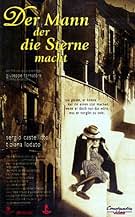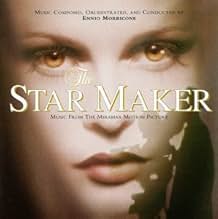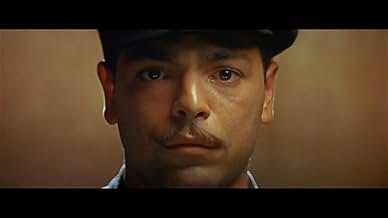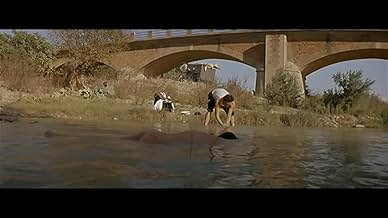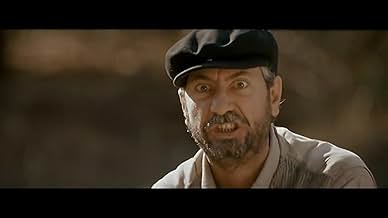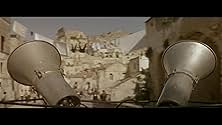VALUTAZIONE IMDb
7,3/10
5656
LA TUA VALUTAZIONE
La storia di un fotografo e del tipo di persone che incontra.La storia di un fotografo e del tipo di persone che incontra.La storia di un fotografo e del tipo di persone che incontra.
- Regia
- Sceneggiatura
- Star
- Candidato a 1 Oscar
- 13 vittorie e 16 candidature totali
Recensioni in evidenza
This movie, by the director of Cinema Paradiso, "disappointed" a lot of American movie reviewers because it lacks the sentimentality and pat structure of CP. But it's far more epic, poetic & imaginative (& much less PC) and absolutely gorgeous to watch. Ignore the puritans at the NY Times & SF Chronicle. Watch this movie. You won't be sorry.
Joe Morelli (Sergio Castellitto) is a flimflam man who is driving around the rural villages of Sicily shortly after World War II selling potential stardom for fifteen hundred lira. He has a motion picture camera and loudspeaker on his truck. As he drives through the villages he broadcasts to the people that he is from the film industry of Roma and he is giving screen tests in order to discover natural talent.
He sets up his truck and tent typically in the town square. His technique is to tell everyone that they have a wonderful face, hidden talent, that they are naturals and diamonds in the rough. He hands out fliers with some dialogue from "Gone with the Wind" on them that they should practice reading before appearing before his camera. He has discovered that people will fall for his flattery and pay him for the fake screen tests.
As we watch the film we discover that people will put their hearts and souls into the experience of appearing before his camera. They don't just read the lines from Gone with the Wind. They tell their life stories in miniature. They bare their hearts and souls to the flimflam man in the hope that someone will hear and see their anguish, their pain, their experience. To Morelli, who has been to Hollywood and failed, this is just a way to make a lira. He has a gift for the hustle and is blind to the real emotion that he evokes.
A woman believes his teenaged daughter has the talent to make it in the movies. She begs Morelli to take her to Roma. She even has sex with him and promises to allow him to be her daughter's first lover. But Morelli moves on to the next town. He is stopped by the local police chief, but Morelli manages to flatter him into appearing before his camera and then applauds the chief's performance. Three highwaymen stop to rob Morelli. He is able to convince them that Roma longs for their raw talent. And so on, as he travels over the cobblestones and over the winding roads.
Finally he meets beautiful Beata (Tiziana Lodato) who is 15 or 18. She isn't sure. She works in the convent, bathing the sick and scrubbing the floors. She exposes herself to the local tax man to raise the 1500 lira needed for Morelli's screen test. She is strikingly beautiful from head to toe, and the tax man exclaims, "You are a statue!" when he sees her body. Morelli is reluctant to get involved with someone so young even though she throws herself at him.
What happens after this I will not say since it would spoil the film for those who have not seen it. But watch for the con man to get conned, among other things. Despite his villainy, there is a sense that Morelli is a man that we can identify with and understand. I think it is this quality that director Giuseppe Tornatore has developed in his character that carries the film, and Sergio Castellitto whom I saw recently in Non ti muovere (Don't Move) (2004) really becomes the part.
Tornatore, who made a splash with the critically acclaimed Cinema Paradiso (1988) wrote the original material here and worked on the script in addition to directing. While I thought Cinema Paradiso was an excellent film, I liked this one even more. Both are original works of art, but I found L'uomo delle stelle more engaging. Particularly striking are the beautiful village scenes, the faces of the people, and the photography of the Sicilian countryside and ruins.
(Note: Over 500 of my movie reviews are now available in my book "Cut to the Chaise Lounge or I Can't Believe I Swallowed the Remote!" Get it at Amazon!)
He sets up his truck and tent typically in the town square. His technique is to tell everyone that they have a wonderful face, hidden talent, that they are naturals and diamonds in the rough. He hands out fliers with some dialogue from "Gone with the Wind" on them that they should practice reading before appearing before his camera. He has discovered that people will fall for his flattery and pay him for the fake screen tests.
As we watch the film we discover that people will put their hearts and souls into the experience of appearing before his camera. They don't just read the lines from Gone with the Wind. They tell their life stories in miniature. They bare their hearts and souls to the flimflam man in the hope that someone will hear and see their anguish, their pain, their experience. To Morelli, who has been to Hollywood and failed, this is just a way to make a lira. He has a gift for the hustle and is blind to the real emotion that he evokes.
A woman believes his teenaged daughter has the talent to make it in the movies. She begs Morelli to take her to Roma. She even has sex with him and promises to allow him to be her daughter's first lover. But Morelli moves on to the next town. He is stopped by the local police chief, but Morelli manages to flatter him into appearing before his camera and then applauds the chief's performance. Three highwaymen stop to rob Morelli. He is able to convince them that Roma longs for their raw talent. And so on, as he travels over the cobblestones and over the winding roads.
Finally he meets beautiful Beata (Tiziana Lodato) who is 15 or 18. She isn't sure. She works in the convent, bathing the sick and scrubbing the floors. She exposes herself to the local tax man to raise the 1500 lira needed for Morelli's screen test. She is strikingly beautiful from head to toe, and the tax man exclaims, "You are a statue!" when he sees her body. Morelli is reluctant to get involved with someone so young even though she throws herself at him.
What happens after this I will not say since it would spoil the film for those who have not seen it. But watch for the con man to get conned, among other things. Despite his villainy, there is a sense that Morelli is a man that we can identify with and understand. I think it is this quality that director Giuseppe Tornatore has developed in his character that carries the film, and Sergio Castellitto whom I saw recently in Non ti muovere (Don't Move) (2004) really becomes the part.
Tornatore, who made a splash with the critically acclaimed Cinema Paradiso (1988) wrote the original material here and worked on the script in addition to directing. While I thought Cinema Paradiso was an excellent film, I liked this one even more. Both are original works of art, but I found L'uomo delle stelle more engaging. Particularly striking are the beautiful village scenes, the faces of the people, and the photography of the Sicilian countryside and ruins.
(Note: Over 500 of my movie reviews are now available in my book "Cut to the Chaise Lounge or I Can't Believe I Swallowed the Remote!" Get it at Amazon!)
Joe Morelli is a scam artist that loves to prey on innocent people in the poorer regions of Italy. As we meet him, he is trying to swindle whoever he can from the impoverished Sicilians that happen to live in those forgotten towns. The movie is set after WWII in a ruined Italy that hasn't come out of its defeat and most of the population is having a hard time eking a life, mainly from the land.
Morelli, pretending to be a scout for a big Rome studio is seen traveling the back ways of Sicily with his small van that opens up to a mini studio where the unsuspecting people of those towns flock for a screen test that no one will ever see. For the price of 1,500 lire they get a chance to act for the con man and his camera, hoping they will be the next discovery, once the film is seen by the big casting directors in Rome.
Giuseppe Tornatore has a love for the cinema, as he showed with "Nuovo cinema Paradiso", which chronicled, perhaps, his own childhood in a small town in Sicily. Mr. Tornatore is a director that hasn't forgotten his roots, as he demonstrates with this tale about innocent common people being duped because their love and the allure of the cinema, that dream making medium.
Sergio Castellitto, one of the best actors working today in the Italian cinema, does a wonderful job interpreting Morelli for the director. His Morelli is never mean, or nasty; in fact, one of his best qualities is the way how he bonds with his subjects. Mr. Castellitto does wonders as the man without scruples, who eventually is found by one person who he made a fool of. Also, Morelli finds in Beata, the sweet and innocent girl from a convent a love he never knew he was capable of having.
Beata, is played by Tiziana Lodato, a beautiful young actress who is the one that makes Morelli understand his guilt after he is beaten and young Beata is interned in an institution. Leopoldo Trieste is seen as the mysterious figure who comes to recite a Spanish text for his screen test. Franco Scaldatto has some good moments in the film.
This is a film that will not disappoint fans of Giuseppe Tornatore because of his vision about people love for the cinema.
Morelli, pretending to be a scout for a big Rome studio is seen traveling the back ways of Sicily with his small van that opens up to a mini studio where the unsuspecting people of those towns flock for a screen test that no one will ever see. For the price of 1,500 lire they get a chance to act for the con man and his camera, hoping they will be the next discovery, once the film is seen by the big casting directors in Rome.
Giuseppe Tornatore has a love for the cinema, as he showed with "Nuovo cinema Paradiso", which chronicled, perhaps, his own childhood in a small town in Sicily. Mr. Tornatore is a director that hasn't forgotten his roots, as he demonstrates with this tale about innocent common people being duped because their love and the allure of the cinema, that dream making medium.
Sergio Castellitto, one of the best actors working today in the Italian cinema, does a wonderful job interpreting Morelli for the director. His Morelli is never mean, or nasty; in fact, one of his best qualities is the way how he bonds with his subjects. Mr. Castellitto does wonders as the man without scruples, who eventually is found by one person who he made a fool of. Also, Morelli finds in Beata, the sweet and innocent girl from a convent a love he never knew he was capable of having.
Beata, is played by Tiziana Lodato, a beautiful young actress who is the one that makes Morelli understand his guilt after he is beaten and young Beata is interned in an institution. Leopoldo Trieste is seen as the mysterious figure who comes to recite a Spanish text for his screen test. Franco Scaldatto has some good moments in the film.
This is a film that will not disappoint fans of Giuseppe Tornatore because of his vision about people love for the cinema.
Emotions of enthusiasm break down in sensitive portraits of poor Sicilians who reveal their inner self in two minutes they have in front of a camera. Realism all the way and yet i had to think of the enthusiasm Kusturica had in Black Cat White Cat although none of the characters are that absurd. If you see European movies like this after all the American commercial rubbish you get a glimpse of what film can give us! Good acting and writing, beautiful locations, a lot of strong character studies and very, very impressive camera work. Absolutely not a waste of your time!
A seemingly heartless con-man (Sergio Castellito) goes around post-World War II Sicily filming most everyone, for a price, and leads villagers to believe that he is a talent scout for a film studio. Naturally many flock to the apparently kind stranger and do what they can to escape lives of poverty and unhappiness. Castellito meets up with many vivid characters, but none more so than the beautiful Tiziana Lodato (in her first screen role). Soon the young lady is begging Castellito to take her to the land of movie-making and in the process he falls in love with her and acquires a conscience. Apparently he may change his ways and then again maybe not, but it becomes very clear that the local authorities may catch up to Castellito before the film runs its course. "The Star Maker" was a Best Foreign Language Film nominee at the Academy Awards in 1995. Co-written and directed by horribly under-rated Italian film-maker Giuseppe Tornatore (who struck Foreign Language Oscar gold in 1989 with "Cinema Paradiso", one of my all-time favorite pictures), "The Star Maker" is a flawed work because of a strange tone that makes it an uneven experience at times. Humorous situations early point the way to a free-wheeling comedy, but soon drama sneaks in and by the end the drama has literally chased the early comedic routines away. The performers come and go, but Lodato's appearance about half-way through was enough to put the movie over the top. She just shines in a film of illuminated darkness and ultimately steals the show from Castellito by the heart-breaking finale. Tornatore was able to grab everyone with "Cinema Paradiso". Regardless of whether you liked that film or not, you should have cared for the primary characters. "The Star Maker" is a little more difficult in that regard. It holds its audience at arm's length most of the time and almost never hugs as tight as it should have. The final haunting scenes are reminiscent of the emotionally-charged montage to the magic of motion pictures in "Cinema Paradiso" and thankfully by that point most everything was presented well enough to make "The Star Maker" an important and worthy addition to the Italian world of films. 4.5 out of 5 stars.
Lo sapevi?
- QuizTiziana Lodato's debut. She has full nude scenes and when filming began (september 1994), she was still a minor. But she said she was already 18 when she played the explicit sex scene with Sergio Castellitto. However her mother was upset. "She absolutely did not want me to make the film, although everyone reassured her by telling her Tornatore is an important director, he won the 'Oscar', but she did not give a damn. She said: my daughter's nude scenes, no. In the end I convinced her," Lodato said.
- Citazioni
Joe Morelli: We are here to offer you a fantastic future!
I più visti
Accedi per valutare e creare un elenco di titoli salvati per ottenere consigli personalizzati
- How long is The Star Maker?Powered by Alexa
Dettagli
- Data di uscita
- Paese di origine
- Lingue
- Celebre anche come
- The Star Maker
- Luoghi delle riprese
- Poggioreale, Sicily, Italia(ghost town)
- Aziende produttrici
- Vedi altri crediti dell’azienda su IMDbPro
Botteghino
- Lordo Stati Uniti e Canada
- 371.674 USD
- Fine settimana di apertura Stati Uniti e Canada
- 40.915 USD
- 10 mar 1996
- Lordo in tutto il mondo
- 371.674 USD
Contribuisci a questa pagina
Suggerisci una modifica o aggiungi i contenuti mancanti

Divario superiore
By what name was L'uomo delle stelle (1995) officially released in Canada in English?
Rispondi

